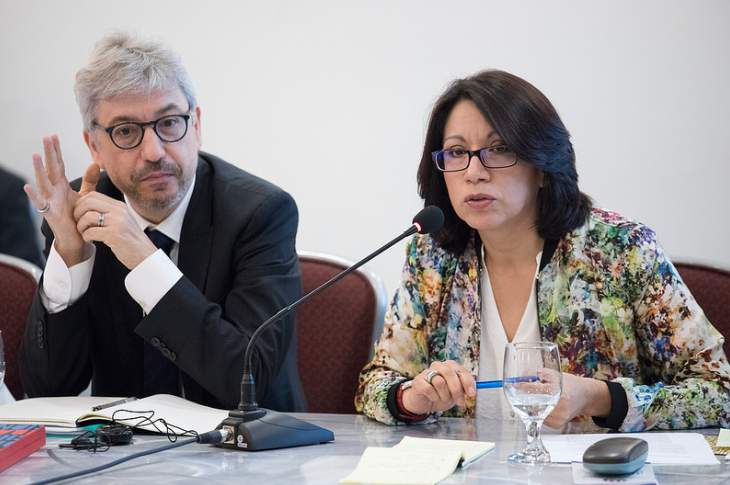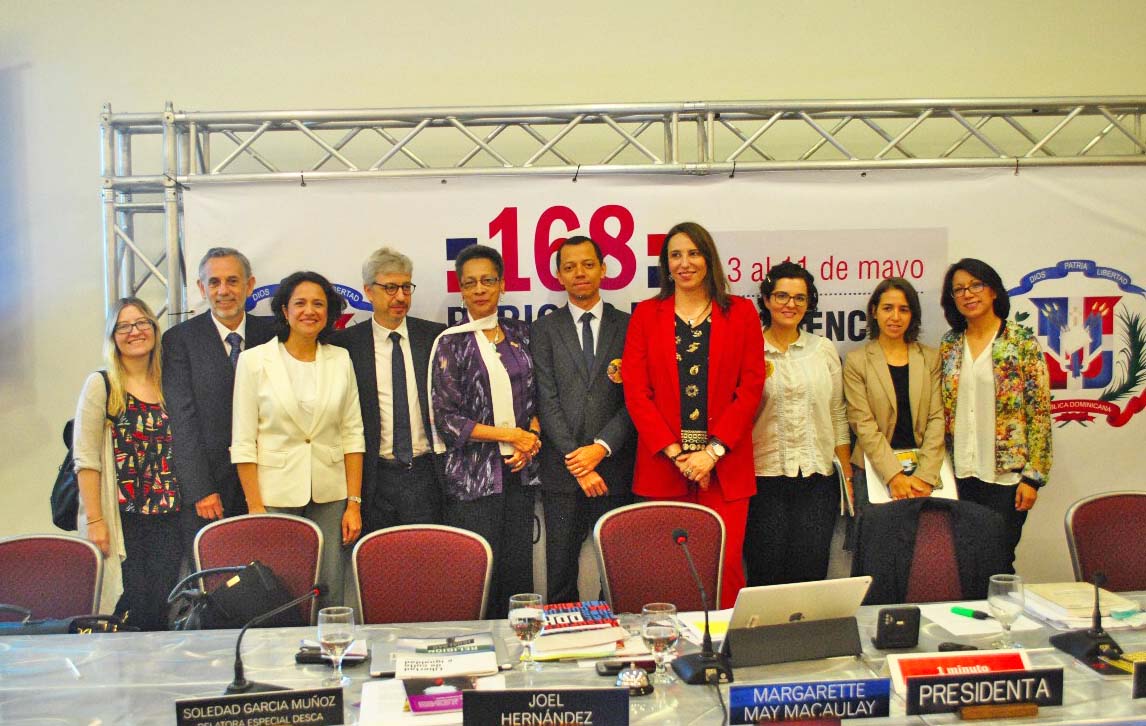Latin American Countries Must Reform Their Fiscal Policies to Guarantee Human Rights
Thematic report and hearing at the Inter-American Commission on Human Rights
“The most effective way to assess the commitment of a State and its institutions to human rights is to look at its budget […]
We need to generate a profound and urgent dialogue with the world of economics and finances at both the national and international levels.”
- Soledad García Muñoz, IACHR Special Rapporteur on Economic, Social, Cultural and Environmental Rights at the Inter-American Commission on Human Rights (IACHR)
New York/Santo Domingo, May 25—The deep connection between fiscal policies and human rights has recently been illustrated by troubling events in Nicaragua, Puerto Rico, Brazil and other countries throughout Latin America. Unjust fiscal policy measures adopted by these countries have stripped basic social protections from their populations, exacerbating social and economic rights deficits and provoking unrest that in some cases has led to violence and repression.

This grim reality underlines the relevance of the recent thematic hearing hosted by the Inter-American Commission on Human Rights (the Commission), which focused on the role of fiscal policy in the fulfillment of economic, social and cultural rights (ESCR) in Latin America. The 168th session of the Commission, running from May 3rd to 11th, was petitioned by the Center for Economic and Social Rights (CESR) and a coalition of 12 civil society organizations from the region (listed below).
On the last day of the session, representatives from CESR, OXFAM, INESC, CELS, Dejusticia, ACIJ, APRODEH, ForoSalud and the Buenos Aires Public Defense Ministry presented arguments and evidence of the impacts of regressive and discriminatory fiscal policies on human rights. Coalition members presented the Commission evidence of the impact of unprecedented austerity measures in Brazil, insufficient resource mobilization to guarantee social policy reforms in the context of the peace process in Colombia, regressive and unequal fiscal policies perpetuating disparate access to education and health in Peru, budget cuts to social programs in Argentina and the potential for a fairer property taxation system in Buenos Aires City. As the region slides into a period of stagnation, coalition petitioners called for a more intense scrutiny of the human rights impacts of current economic and social policy choices and presented alternatives for generating resources, which these states are failing to implement due to lack of political will.
Margaret Macaulay, President of the Commission, thanked the coalition for the strong and detailed evidence presented highlighting its importance for this body’s work advancing economic and social rights. The arguments and evidence underlying these cases are contained in a report produced by the coalition.
The data and cases cited before the Commission during the session provided robust evidence of how unjust fiscal policies can violate human rights obligations and principles as set out in international and regional treaties in a region that remains the most unequal in the world. Since 2015, the reduction of inequality in the region has slowed, and in 2017 the number of poor people in Latin America increased for the second consecutive year, reaching 187 million. Discussing these findings, Commissioner Flávia Piovesan affirmed that “taxation is key to guarantee rights but it can also be a source of rights violations,” while Commissioner Joel Hernández stated that “budgets should be based on the sustainable development needs of the people.”

During the hearing, Gaby Oré Aguilar, Deputy Executive Director of CESR, emphasized the urgent need to address fiscal policy as a human rights issue. “Fiscal policy is a public policy and as such is subject to accountability before human rights bodies. These norms and principles can strengthen the essential functions of fiscal policy and taxation through the mobilization of resources and the redistribution of wealth and accountability between the state and its citizens. Human rights norms and principles have the potential to change the way these policies are designed, implemented and evaluated,” she said.
Since the first IACHR hearing on fiscal policy and human rights promoted by this coalition in 2015, the issue has moved from the margins to the center of the Inter-American System’s agenda. An important milestone in this progression was the 2017 IACHR report on Poverty and Human Rights in the Americas, where the Commission warned that poverty and extreme poverty cannot be confronted without a broad framework of redistributive policies for reducing the extreme levels of socioeconomic inequality plaguing the region (see Par. 494). At the latest session, petitioning organizations made concrete appeals to the Commission to further expand its scope of protection against human rights violations caused by regressive and unjust fiscal policies. They called on the Commission to produce a thematic report on the issue and encouraged national human rights institutions to strengthen their oversight role of States’ fiscal policies.
This initiative was organized by the Center for Economic and Social Rights (CESR), Instituto de Estudos Socioeconômicos (INESC), Conectas Derechos Humanos, Plataforma de Derechos Humanos (DHESCA Brasil), Justiça Global, Ministerio Público de la Defensa de la Ciudad Autónoma de Buenos Aires, Asociación Civil por la Igualdad y la Justicia (ACIJ), Centro de Estudios Legales y Sociales (CELS), Centro de Estudios de Derecho, Justicia y Sociedad (Dejusticia), Foro Salud, Asociación Pro Derechos Humanos (APRODEH) and OXFAM.
The video of the hearing is available here.
Follow the conversation on Twitter: #RecursosParaLosDerechos
For more information, contact CESR Communications Manager Terry Roethlein at troethlein@cesr.org.
First image of Horacio Corti, Ministerio Público de la Defensa de la Ciudad Autónoma de Buenos Aires and Gaby Oré Aguilar, CESR, courtesy of Comisión Interamericana de Derechos Humanos.
Second image courtesy of Oxfam.